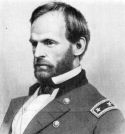| |

William Tecumseh Sherman (click on image to enlarge) was the
seventh child of Charles Sherman and Mary Hoyt Sherman. He was born in Lancaster, Ohio, in
a small frame house located next door to the large Hon. Thomas Ewing home. Sherman's came
to Lancaster just before the War of 1812 because Charles' father, Judge Charles Taylor
Sherman of Norwalk, Connecticut, had been given, as indemnity for property lost in
Connecticut in the Revolutionary War, title to 2 sections of land in the Western Reserve.
Charles had been admitted to the bar in 1810 and married Mary Hoyt shortly thereafter.
They came by horseback and covered wagon with their 1st son Charles. Their second child,
Elizabeth, was born 10 days after they reached Lancaster. When Charles died in 1829, Mary
was left with eleven children. Thomas Ewing offered to take the "smartest" of
the boys to raise as his own. Although William was never legally adopted by the Ewing
family, he lived with them from the age of nine.
In 1836, Ewing obtained "Cump's" appointment to West Pointe. In 1850, Cump
married Ewing's daughter, Ellen, in a ceremony at Blair House in Washington D.C. during
which time Thomas Ewing held the post of Secretary of the Interior. The marriage was
attended by President Taylor. He and Ellen had eight children.
William T. Sherman's Civil War record was climaxed by the Atlanta campaign and the
"March to the Sea," bringing him the adulation of the North and the animosity of
the South. After the war, he held the post of commanding general of the army from
1869-1883. Declining to run for presidency, he spent his remaining years writing his
memoirs and touring the speakers' circuit. He died in New York in 1891 and was buried in
St. Louis, where his grave is marked by a simple shaft of his own design.
William's brother, John, also achieved fame which nearly equaled that of his older
brother. He studied and practiced law in Mansfield, where he launched his political career
at an early age, becoming a Congressman (1855-1861), U.S. Senator (1861-1881), and
Secretary of Treasury (1877-1881), and Secretary of State (1897-1898). The Sherman
Antitrust Act carries his name.For more
information on the family of William T. Sherman on this website, go to Descendant Database.
Also visit the Fairfield County
Visitors Center to find a list of resources about the life of William T. Sherman. |

|